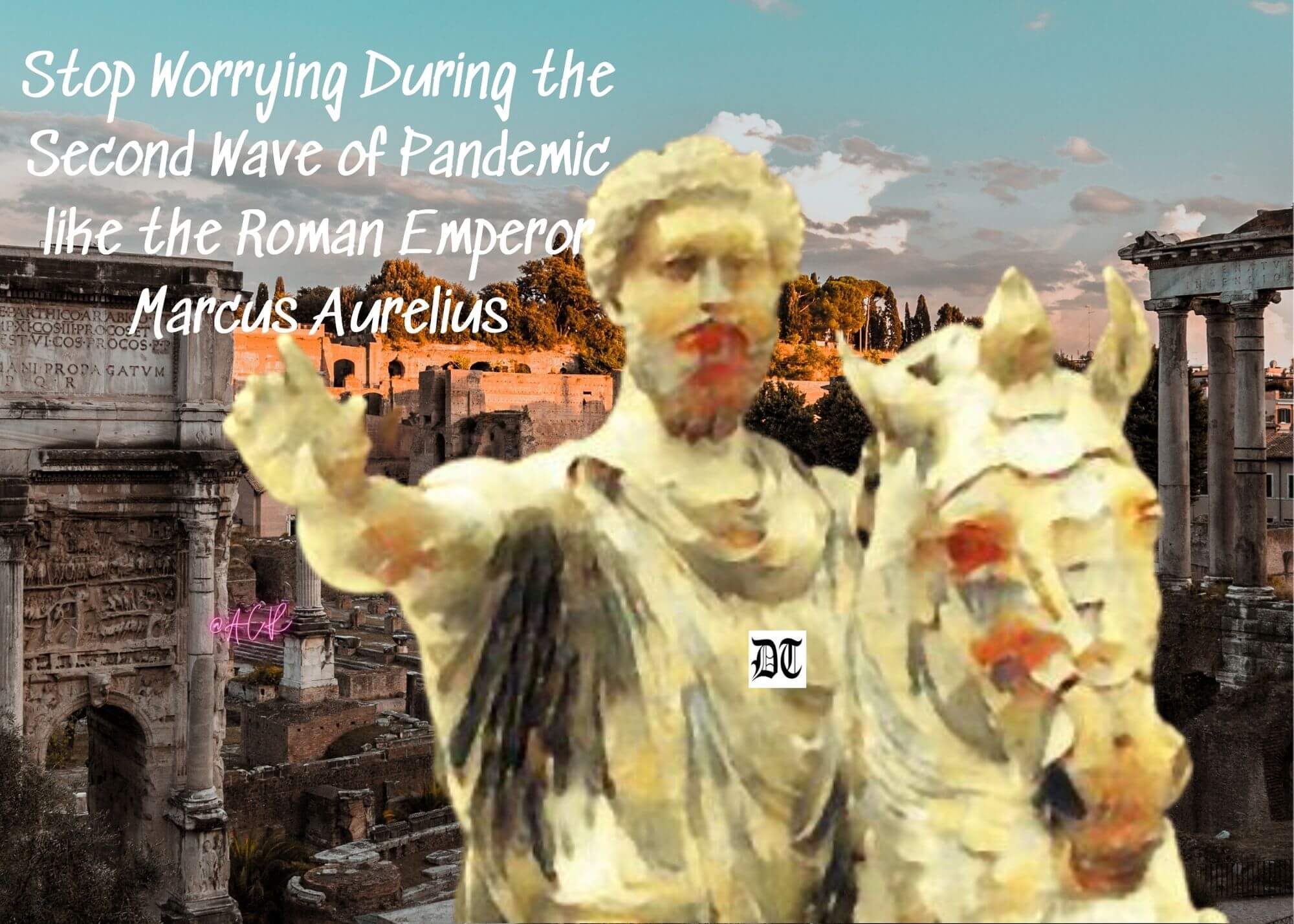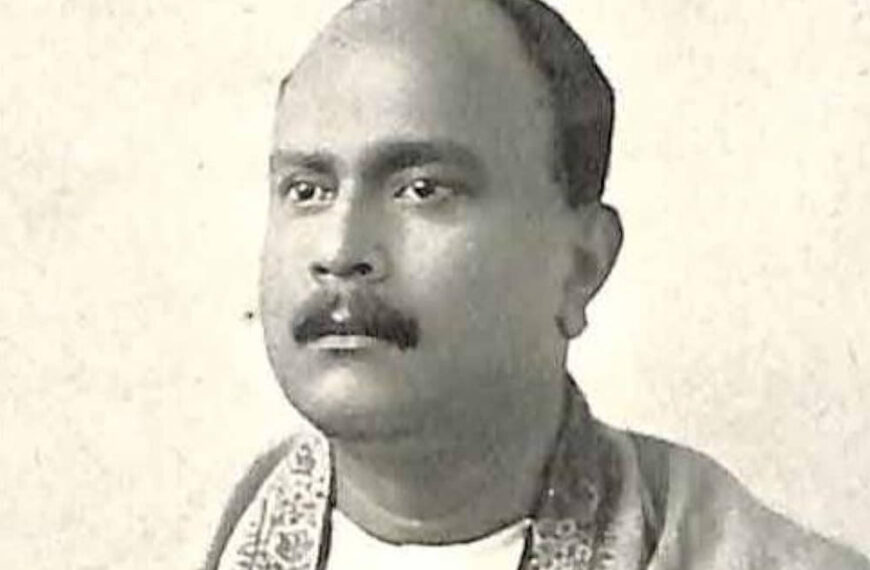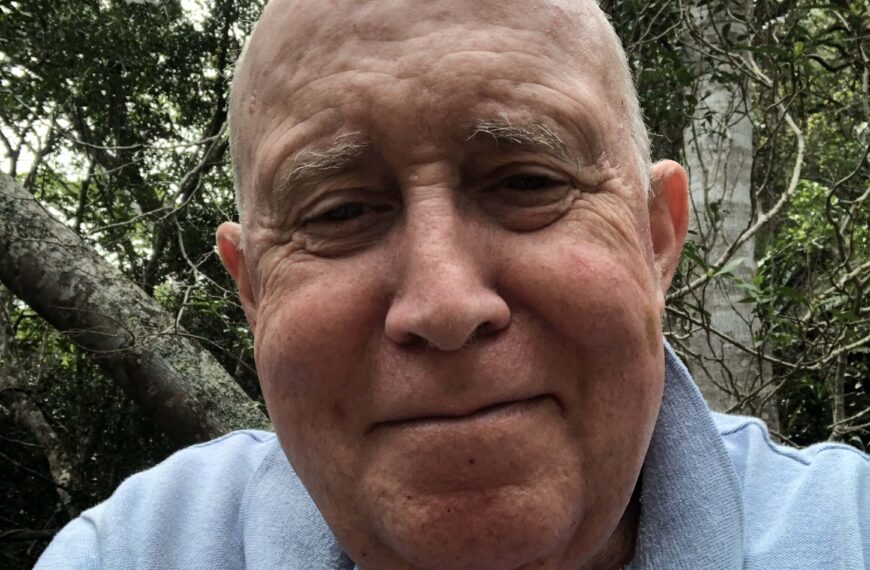Shagufta Hussain revisits the era of the 2nd century AD Roman Emperor Marcus Aurelius and tells us the wisdom that he propounded for handling the pandemic 2000 years back. An exclusive for Different Truths.
Marcus Aurelius was the emperor of Rome during the 2nd century AD, the last in a line of five emperors known to have ruled Rome with authority, humanity, and competence. During his tenure, the Roman Empire suffered from a severe pandemic in the form of the Antonine Plague that broke out in 165 AD and devastated the population of the Roman Empire, causing the deaths of five million people. In the face of disaster, instead of worrying and panicking or fleeing away like the other wealthy officials, Aurelius advocated calm rationalism and kept Rome together. He passed legislation subsidising the cost of funerals to keep bodies from piling up in the streets. When the army was short on recruits, he conscripted gladiators. When the army could not pay the cost of soldiers to replace the dead, he sold off his imperial possessions to finance the effort. Instead of worrying, he could see a problem, solve it, then see another problem and solve that one too without giving way to panic.
During his rule, Aurelius found the time to construct a series of autobiographical writings. Now, these are known as The Meditations.
During his rule, Aurelius found the time to construct a series of autobiographical writings. Now, these are known as The Meditations. These meditations are regarded as some of the greatest works of philosophy. In the second wave of the pandemic, we feel helpless and eventually lead to worrying and panicking. In this respect, the teachings of Aurelius can help us to some extent if we are ready to open our minds.
Let us use some of his wisdom as motivation to help keep us from worrying and stressing too much about the ongoing pandemic and all the other things that we tend to worry about in our everyday, modern lives.
Marcus Aurelius says, “No matter what happens, keep this in mind: it’s the same old thing, from one end of the world to the other. It fills the history books, ancient and modern, and the cities and the houses too. Nothing new at all”. Currently, most of us are rightfully worried about the uncertainties surrounding COVID-19 as we are amid second-wave or tsunami and triple mutations of the virus and the alarming death rates worldwide. Some of us have been affected twice by the COVID-19. Others are bracing for what may come, and all of us are watching the headlines and wondering,” What is going to happen next? We do not know how exactly we’ll be impacted or how bad things might get, and that makes it all too easy to catastrophise and spiral out into overwhelming worry and panic.
In his book, The Meditations, Aurelius tells life is simply history repeating itself.
In his book, The Meditations, Aurelius tells life is simply history repeating itself. Suppose we are worried about losing our lives, losing our near one’s jobs, losing our money and investments or soar relationships in our lives; millions of others have gone through the past and are going through the things. In that case, we are worried about it right now. It means that we experience the same pattern of life repeatedly, just with different formats and other characters. Aurelius tells us whatever is happening today has already happened before. If the world is facing the crisis today, the world has also faced a similar crisis or crises like that in the past, such as Black Death, SARS, Spanish Flu, Ebola, and indeed the Antonine Plague.
But according to Aurelius, it is just life manifesting the same patterns. History taught us that this pattern of life never changes as long as we live. Everything is momentary, and nothing is truly novel. So, why we worry so much when it’s just life repeating itself again and again? Worry is what happens when our minds dwell on negative thoughts, uncertain outcomes or things that could go wrong. When we think about an uncertain or unpleasant situation -such as being unable to pay rent or doing poorly on an exam -our brains become stimulated. When we worry, it calms our brain down and is also likely to cause us to problem solve or take action. In a way, worrying is a way for our brains to handle issues to keep ourselves safe.
Hence worries, doubts and anxieties are a normal part of life.
Hence worries, doubts, and anxieties are a normal part of life. While it is natural to worry about an unpaid bill, an upcoming job interview, normal worrying becomes excessive when it’s persistent and uncomfortable. We constantly worry every day about “what ifs” and worst-case scenarios. We don’t let these anxious thoughts get out of our heads, get negative thinking, and always expect the worst to take a heavy toll on our emotional and physical health. We need to understand that whatever we are worrying about, in reality, has happened before. What seems to be uncomfortable and scary now will soon be old and familiar tomorrow. Instead of worrying too much, we need to keep ourselves calm because we humans are adaptable creatures, and we have a unique capacity to change along with the ever-changing pattern of life.
Marcus Aurelius once said, “It never ceases to amaze me, we all love ourselves more than other people, but care more about their opinion than our own” We live in a boisterous world. Our thoughts are constantly being influenced by the wide variety of noise coming from other people in their judgments and opinions, who make their decisions based on fear and greed. At times, their noise has a massive influence in triggering our fears and making us anxious about ourselves and the problems we might face in the future. In return, we end up paying way too much attention to these people and spend a lot of our time and efforts worrying about what they think about us. In the world we live in, we are more worried about what other people like our friends and family might think of us rather than concentrating on the ways we put into improving our circumstances. It is because of our innate desire to be liked by everyone. So, we constantly seek their approval without realising how much this people-pleasing attitude sabotages our self-confidence and contributes to our worries.
The more we desire the approval of others, the more we become a slave to others.
The more we desire the approval of others, the more we become a slave to others. The ancient Stoics were way ahead of time when it came to not being influenced by other people’s opinions. They pointed out that we do not control the opinions of others and that things we do not control are irregular. The more we keep valuing things that are outside our control, the less control we will have. The truth is no matter how hard we try; we can never please cent percent of others. No matter how hard we try, there will always be people who will resent us; they will be jealous, judge us, hate us, reject us, and so on. We worry too much about these people and worry about the nasty things they will say to us if we do something against their choice.
There are many possible reasons why they say, what they say and why they think. It could be ignorance, frustration, jealousy, but they might be telling us about something we truly lack. If that’s the case, we need to fix it but being upset by the rest is a waste of energy. Worrying about what they say or think about us as foolish as getting upset about the weather. Their voices need to be ignored. But the ongoing outbreak of the virus, we may want to ignore the noise created by the media because more media companies are primarily focused on profit and so routinely over sensationalise specific topics by focusing on the ones that trigger our fears and cause us to worry because concern means clicks and clicks mean money.
So, even more, than ever it is essential to stay updated with the latest news from trusted sources regarding the virus, but if we constantly watch the news or read the information on the internet, we will start to believe that there is nothing else going on in the world apart from this pandemic. So, it is better to spend our time on something that we can influence, like doing something better, for example making contacts with distant relatives and reconnecting or putting serious time and energy into hobbies and skills we want to perfect.
Instead of fearing the worst possible outcome about the future, mindfulness means concentrating on our present and making the most of it.
In the words of Marcus Aurelius, “Remind yourself that it is not the future or what has passed that afflicts you, but always the present.” Stoic mindfulness is about seeing what is up to us in any given situation, focusing on doing that well and on doing the act with kindness towards others. Instead of fearing the worst possible outcome about the future, mindfulness means concentrating on our present and making the most of it.
If we are worried about ourselves or our near one being infected with the virus, being mindful about it will make us aware of the precautions. It will make us feel safe and hopefully help us to avoid the worst possible outcome. While worrying leads us to fear and panic. At the same time, during mindfulness, we are more likely to get into ‘the zone’ or ‘the flow’ to be more aware and preventive of the virus efficiently and as we have a greater sense of well-being and we will be less stressed. Mindfulness might even make us appreciate ourselves. We can be mindful by being conscious about our eating habits, wearing masks, maintaining health protocols, or meditating during the pandemic.
We need to do meditation for10 minutes. The idea is to give our mind a rest from the constant sensory stimulation of all our activities…
We need to do meditation for10 minutes. The idea is to give our mind a rest from the constant sensory stimulation of all our activities and allow it to settle down naturally. Particularly now, 2021, our situation is one of the extreme uncertainties. We don’t know what will happen, how long it will last, or what things will be like when it’s over. One thing we do know, however, is that worrying about it won’t change the outcome. Right now, much of the personal time that used to be part of our daily routines- commutes, time alone at home, going to the store is just not available. It means it’s extra important to practice mindfulness to recharge.
We can decide to set time aside each day to practice mindful activities. In the morning, before everyone is awake, it can be a great time to rally ground ourselves. Morning mindfulness can help set the tone for the day, like doing deep breathing, meditation, exercise, wherever mindfulness activity works for us. We can also practice mindfulness as a family. Designating time to practice mindful activities as a family will help everyone feel less anxious. It could be a daily family yoga session or asking everyone to mention one good thing they heard or saw that day over dinner. Practicing mindfulness helps bring us back to the present and keeps us grounded.
Most of the choices we make today will not benefit us immediately.
Marcus Aurelius succinctly wrote, “Life is short. That’s all there is to say. Get what you can from the present-thoughtfully, justly.” We, humans, live in what researchers call a Delayed Return Environment (DRE). Most of the choices we make today will not benefit us immediately. If we do an excellent job at work today, we will get a paycheck in the time to come. If we save money now, we will have enough for retirement later. Many aspects of modern society are designed to delay rewards until some point in the future. While other animals are worried about immediate problems like avoiding problems or seeking shelter from a storm, humans also worry about potential problems ahead.
Unfortunately, living in a DRE often leads to chronic stress and anxiety for humans because the newest part of our brain, and the part most associated with higher reasoning -the neocortex-has barely evolved since our Paleolithic ancestors around two hundred thousand years ago, unlike our social evolution which is only accelerating. Hence, the mismatch between our old brain and our new environment significantly impacts the amount of worry, stress, and anxiety we experience today.
Since we cannot travel back and change the timeline of our civilisation, our best option is to ‘shift our worries’ from long-term problems to daily routines…
Since we cannot travel back and change the timeline of our civilisation, our best option is to ‘shift our worries’ from long-term problems to daily routines that will help solve those problems. For example, instead of worrying about living longer, focusing on meditation. Instead of worrying about losing enough weight for the wedding, focusing on cooking a healthy dinner. The critical insight that makes this strategy work is making sure our daily routine both rewards us regularly and stops us from worrying about future uncertainties. In other words, this strategy is all about making most of our today, our present.
Similarly, suppose we are worried about uncertainties pertaining to this ongoing pandemic. In that case, we can shift our worries by asking ourselves-how can we make most of our day today? We might realize that we want to read a book and we never timed to read the book before or start learning a new hobby. We can use this time to get rid of some harmful habits that we never could because of our work environment life situation. If we are uncertain about our job, then we can shift our worries to learning a new skill that might serve us as an advantage in keeping our job or finding a new exciting career. Our only purpose is to make the most of our present without worrying too much about our future.
Stoics believe that every moment is just another opportunity to practice kindness.
Marcus Aurelius asks us, “Is helping others less valuable to you? Not worth your effort?” Stoics believe that every moment is just another opportunity to practice kindness. When plague and famine hit the Roman Empire, dead bodies started to pile up. Even when all the wealthiest people in the empire fled, Marcus Aurelius decided to stay in Rome. He stood bravely, and he did everything he could, summoning priests of every sect and doctors of every specialty and touring the empire in an attempt to purge it of the plague, using every purifying technique known at the time. He attended funerals and gave speeches. He showed up for his people, assuring them that he did not value his safety more than his responsibility. He kept himself strong for others. He was not delusional, nor gave people any false hopes or misleading numbers. In fact, he was deeply moved by the suffering of the people that he publicly wept after overhearing someone saying, “Blessed are they who died in the plague.” A good leader is strong but feels the pain of others deeply.
Most of us would like to think of ourselves as a kind person and want to commit to helping society. Still, we end up falling short to do whatever we said that we would do. Between the business of our daily lives and excessive worrying about what might or might not happen in future, we forget the world around us and others in it that need our help today. We often do not show kindness because we don’t have enough money to donate. However, they’re always kind and don’t involve money. We can be kind by showing respect to others, by donating our time to helping out a group of people. We can donate old things that we don’t need anymore. We can volunteer at places all over our city; most likely, the truth is that any act of kindness can help us to demonstrate that positive identity and make us feel proud of ourselves. Once we are proud of ourselves, and once we have self-confidence, we stop worrying about the unknown.
Even though Aurelius wrote The Meditations 2000 years ago – his Stoicism still carries substantial weight today. Stoicism is a school of Hellenistic philosophy founded by Zeno of Citium in Athens in the early 3rd century BC. Even though it is over 2000 years old, more and more people are discovering how Stoicism is relevant to modern times and can be applied in straightforward yet robust ways in the time of pandemic and the time before the pandemic.
Visuals by Different Truths





 By
By

 By
By
 By
By